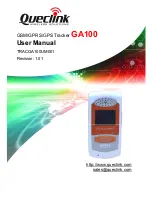
Installation
Procedures
Apollo CNX80 Installation Manual
560-0982-00 Rev D
2-39
2.9 A
NTENNA
I
NSTALLATION AND
C
ONNECTIONS
The CNX80 requires three antennas: Com antenna, GPS antenna, and Nav antenna. Follow the
manufacturer’s installation instructions for mounting the antennas.
2.9.1 C
OMM
A
NTENNA
The CNX80 requires a standard 50
Ω
vertically polarized antenna. Follow the antenna manufacturer’s
installation instructions for mounting the antenna.
The antenna should be mounted on a metal surface or a ground plane with a minimum area of 18 x 18
inches. The antenna should be mounted a minimum of two feet away from GPS antennas.
The comm antenna should also be mounted as far apart as practical from the ELT antenna, preferably one
on top and the other on the bottom of the aircraft fuselage. Some ELTs have exhibited re-radiation
problems generating harmonics that may interfere with GPS signals. This can happen when the comm
(CNX80 or any other comm) is transmitting on certain frequencies such as 121.15 or 121.175 MHz, which
may cause the ELT output circuit to oscillate from the signal coming in on the ELT antenna coax.
The antenna coax cable should be made of RG-142B or a comparable quality 50
Ω
coax. Assembly
instructions for the rear coax connector are included in Figure 2-11.
2.9.2 GPS
A
NTENNA
The mounting location and cable connections for the GPS antenna are very important. The antenna should
be mounted no closer than two feet from VHF comm transmitter antennas, six inches from other antennas
emitting less than 25 watts, and two feet from higher power antennas. See A-33 GPS Antenna Installation
Manual, p/n 560-0949-xx for more information on GPS antenna installation. Special care should be taken
to ensure that the GPS antenna is not mounted in close proximity to antennas that may emit harmonic
interference at the L1 frequency of 1575.42 MHz. Refer to AC 20-138A Airworthiness Approval of Global
Navigation Satellite System (GNSS) Equipment for additional information and guidelines.
NOTE
The internal CNX80 Com does not interfere with its own GPS receiver. However,
placement of the CNX80 GPS antenna relative to other com transceivers and antennas
(including the CNX80 Com antenna) is critical.
The connectors are included in the installation kit, and are intended for use with RG-142B size coax cable. If
using a different diameter coax, alternative connectors may be required. Assembly instructions for the connectors
are included in Figure 2-11. RG-142B cable can be used as long as the length is less than 35 feet. For longer
lengths, use low-loss 50
Ω
coax.
Suggestion:
Temporarily locate the GPS antenna with coax connected to the
CNX80
and check the GPS
performance as described in the GPS Operation and Position test in the Post Installation Checkout in
section 3.3.2.1.2. Once a suitable location has been verified, then permanently mount the antenna.
NOTE
If using a GPS antenna that was already on the aircraft, or if mounting the antenna closer
than two feet from a comm antenna, conduct the GPS Operation and Position test in the
Post Installation Checkout on page 3-21. If the CNX80 passes the test, then further
measures are not necessary.
Summary of Contents for Apollo CNX80
Page 1: ...Apollo CNX80 Installation Manual September 2003 560 0982 00 Rev D...
Page 10: ...Table of Contents viii 560 0982 00 Rev D Apollo CNX80 Installation Manual NOTES...
Page 30: ...General Information 1 20 560 0982 00 Rev D Apollo CNX80 Installation Manual NOTES...
Page 114: ...Periodic Maintenance 6 2 560 0982 00 Rev D Apollo CNX80 Installation Manual NOTES...
Page 134: ...Appendix D Interconnect Diagrams D 2 560 0982 00 Rev D Apollo CNX80 Installation Manual NOTES...
Page 167: ......
Page 168: ......
















































